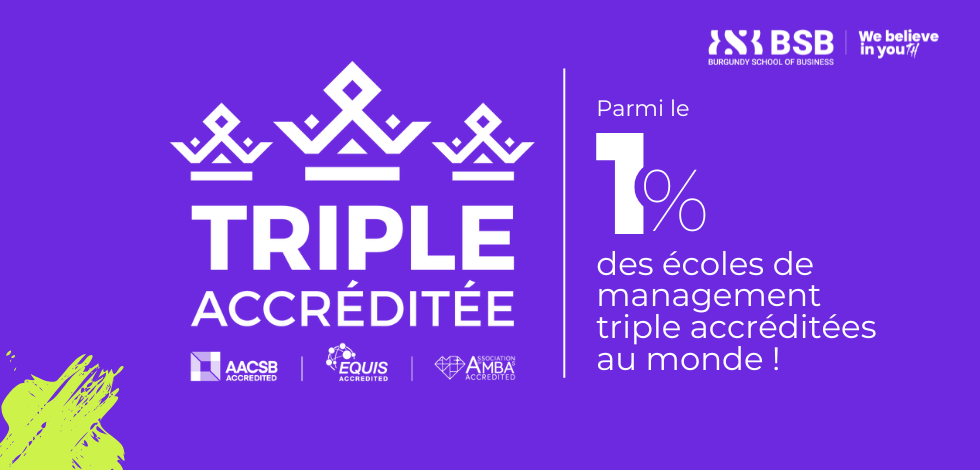How to become a communications director: a comprehensive guide to Excel in this strategic role

Note: For reasons of readability and fluidity of the text, we use the term “communication director” in this article. This name obviously includes the functions of communication director. At BSB, we believe in equal talent and opportunities, regardless of gender, background, or identity.
How to become a communications director In the age of digital and AI? Did you know that more than 80% of a brand's image is now based on its ability to Innovating And Well Communicate ? A true conductor, the” DirCom ” Coordinate the Strategic actions To Build and Maintain the Reputation of a Company. Its role goes well beyond press releases: it promotes a Global vision, anticipate the Trends And Orchestrate Teams to Create a Coherent Message Across All Channels. The challenges are numerous: control From social networks to storytelling, through alignment with societal values. In this article, we will see in detail the essential missions of the communication director, the skills required, career prospects and above all, the training courses to access this key position.
What does the job of communication director consist of?
If you still imagine the Director of Communication Like a who relays press releases, forget that image. Today, this role is a Strategic Pillar Of any organization.
Ace Dircom, You Embody the Voice of the Company. You define the Brand positioning, supervise the speeches, and coordinate all the channels: Internally, External, Institutional, digital. You Take Care of the coherence of the image, Of the speech and the graphic charter.
And in critical moments? You are the one who gets called first. Media crisis, bad buzz on the networks, sensitive announcement... You Must Keep a Cool Head and Protect the Reputed of your business with accuracy and responsiveness. Your soft skills will take over from your communication skills.
Because it is at the crossroads of marketing, public relations and strategy, the position of communication director has become an indispensable link in ensuring the sustainability and growth of a company.
📌 Above all, it is a personality, a role of Visionary, of Diplomat And of Leading, often in direct contact with the general management.
The Main Missions of the Communication Director
If you are considering Become Communications Director, get ready to put on several hats. Your role is not limited to designing marketing materials : you orchestrate everything related to the reputation and image of your company, by combining creativity, rigor and strategic sense.
1. Define a 360° vision and manage brand image
Your role is to design and deploy a Communication strategy global, aligned with the goals of the company.
You are the guarantor of consistency and Strength of Your Company's Message. Before launching any campaign, you develop an overall vision: what brand universe do you want to create? What key values do you want to highlight? Each communication channel (website, social networks, traditional media) must reflect this identity in order to leave a strong impression on the public mind.
2. Coordinate teams, agencies and partners
Your mission: Make Varied Profiles Work Together (graphic designers, editors, community managers, communication managers, press officers, etc.) and harmonize their actions. You become the anchor point that ensures the fluidity of exchanges and the quality of deliverables. You also communicate with external service providers (communication agencies, influencers, event organizers) so that Each collaboration respects the budget, the schedule and, above all, the identity of your brand.

3. Innovating in the face of digital and societal challenges
At a time when consumers expect more transparency and commitment from businesses, you are playing a decisive role. Your ability to Detect trends, to respond quickly to crises and to Manage multi-channel communication campaigns Allows you to make a difference. You rely on Digital tools and performance indicators To continuously adjust your strategy, making sure to always highlight the values and credibility of the company.
It is a job where you must always stay one step ahead, while knowing how to adapt to the unexpected. TO BSB, students learn to manage these types of responsibilities during their studies by Bachelor in Management, via Concrete Projects And Real Cases Offered by our partners. Then later, more specifically if they choose the specialization of Master Marketing and Communication.
📌 In short, you occupy a central position: you unite teams, you inspire the strategy and you defend the identity of your brand, so that it shines in a sustainable way.
The Essential Hard Skills to Shine as a DirCom
If you aspire to become a communications director, you will need to develop a very comprehensive set of skills. Your role requires as much technical know-how as human qualities to orchestrate the reputation of a company and innovate in the face of various challenges.
- Storytelling : as the “narrator” of the brand, you master the art of telling a story that captivates and differentiates the company from its competitors.
- Data analytics : monitoring performance indicators (engagement on social networks, media coverage, etc.) allows you to adjust your strategy and allocate resources effectively.
- Digital tools : from content management (CMS and CRM) to online monitoring, including the professional use of social networks, mastering a wide range of tools will make you gain in responsiveness and relevance.
Transversal leadership: You don't just manage an internal team; you bring together UX designers, graphic designers, video artists, communication agencies, lawyers, influencers.
Expected Personal Soft Skills
In the age of AI where hard skills are no longer a sufficient basis for applying for positions of responsibility, soft skills, human skills are popular with recruiters. And soft skills are not innate, they can be worked on and tamed. And AI will not be able to replace them. Thus, your soft skills will make the difference with equal skills.
- Leadership : you unite your teams, set a course and instill a positive dynamic. Your department members should be able to rely on your ability to make informed decisions and maintain morality in times of crisis.
- Creativity : you find original and impacting angles to convey the company's message, while surprising your target audiences.
- Cold-blooded : keep a calm voice when Twitter flares up or when a product launch gets out of hand.
- Adaptability : the world of communication is changing rapidly. You need to react quickly to news, crises, market trends, and new technologies.
- Ongoing Curiosity : whether it's generative AI or responsible influence, you learn before others and turn these signals into opportunities.
By combining these missions, skills and qualities, you become the invisible but indispensable “conductor” of the reputation and growth of your company. It is a demanding job, but deeply stimulating for those who love innovation, responsibility and the direct impact on the success of a brand.
At BSB, we make it a point of honor to transmit the necessary soft skills (critical thinking, ability to inspire, decision-making agility, etc.) to become competent professionals sought after by companies in all our training courses.
📌 Specializations in Marketing & Communication Or in Event communication Develop precisely the skills expected to become a communication director. You learn to juggle strategy, creation and performance. And you are supported by professionals in the sector to adjust your posture and your impact.
What studies do you need to become a communications director?
The job of communication director requires a clever mix of strategy, creativity and digital agility. These skills are built as much on the school benches as in contact with the field. Starting early, choosing the right course and capitalizing on professional experiences (internships, apprenticeships) make all the difference when you aim to manage an international brand tomorrow.
Possible courses after the bac
As soon as you leave high school, several doors open to you.
BTS/BUT Communication (2 years)
You learn the field: press release writing, media plan, DTP, event management. It is the fast track to the first positions of communication assistant or social media manager. By not continuing your studies beyond the BTS, you will remain on executive positions before climbing the ranks. The BTS also does not allow you to work on your openness to the world through an international exchange during your studies.
License and Pro license (3 years)
At the university, you strengthen your academic bases: media sociology, digital culture, communication law. A professional license in the third year adds a strong operational dimension and opens the door to business school competitions or university masters. However, the international dimension and internships in companies are strongly associated in this course.
Bachelor in Management or In communication
This course lays the foundations: media culture, acquisition of a project methodology and first speeches in the front of a professional audience. At BSB, for example, the Bachelor in Management Immerse yourself, from the first year, in the fundamentals of marketing, storytelling and data analysis.
The third year can be carried out alternately, in order to transform theory into operational reflexes with partner companies. This work-study program, financed by the host company, allows you to graduate with a real track record of projects in your name and an already solid network.
The Bachelor in Media, Culture and Communication will plunge you directly into the world of communication.
The Bachelor in Management is also a great opportunity to put theoretical learning into practice through internships in companies from the 1st year, via student associations and by going abroad.
In addition, from the 1st year at BSB and throughout your studies at BSB, you go beyond the acquisition of classic hard skills, you work on your soft skills, those that will set you apart to land the positions you are aiming for.
Long studies: Bachelor → Master/MSc in communication
To access a management position, a Bac + 5 Training Remains the Norm. Business schools and universities offer several options:
- Tea Master Marketing & Communication (within a Grande École Program) that introduces you to omnichannel strategy, responsible brand content, data analytics and CSR issues;
- The MSc targeting digital communication, crisis communication or marketing innovation to develop business expertise.
📌 At BSB, the Master Grande École specialization in Marketing & Communication Is distinguished by its format: two years as an initial or possible alternation (12 or 24 months), teaching in French or English and opportunities in groups such as Canon, Netflix or BNP Paribas — not to mention the Master's degree at a major international management school in a major international management school in a major international management school in a major international management school in the top 1% of the world, triply accredited by AACSB, EQUIS, AMBA.
The alternating rhythm — three weeks in business, one week at school — gets you used to defending your campaigns in front of real decision-makers, to following concrete KPIs and to adjust your budget like a professional.
Focus on Business Schools
Why choose a Business School ? Because it combines alumni networks, sectoral contacts and support.
BSB is a good example of this ecosystem: more than 1,500 annual work-study offers, Pathfinder™, A personalized and unlimited support system to help you define your ambitions and a point of reference Placing Who will coach you until the signing of your first permanent contract.
In the courses, you rub shoulders with professors and senior managers who confront you with the latest trends (generative AI, responsible influence, live commerce). Outside the classroom, common thread projects with partner companies transform each module into an open-air laboratory: you test a conversational bot, you negotiate an influential partnership and you measure the ROI of your actions on a real budget.
In short, the ideal academic path towards the direction of communication combines: a solid theoretical base, real situations, an active professional network and the possibility of financing your studies via work-study programs. By choosing your program carefully — and by taking advantage of support Pathfinder™ — you are building the skills, credibility and trust you will need to manage, tomorrow, the reputation of a company with global challenges.
To discover 🔍 The School of Media, Culture & Communication for those who want to work in communication
Which course should you choose according to your profile?
Beyond degrees, your starting point influences the best path forward. Here is a personalized GPS.
You are in high school (post-bac)
- Short course + continuation: Long courses do not appeal to you, opt for a BTS Communication that you can do alternately. If you want to continue your studies, you can take a competition to join a 3rd year Bachelor also as possible on an alternating basis and continue with a Master Grande Ecole specialization in Marketing and Communication or Event Communication or Event Communication on an alternating basis also if this is your wish.
- Bachelor in Business School: Start business school directly by saying your wishes on Parcoursup in Terminale. The Bachelor in Management takes place over 3 years (with the 3rd year possible as a work-study program) and paves the way for a Bac+5 with a Master Grande Ecole specialized in communication that you can do alternately. You can also directly launch yourself into the world of work after your bachelor's degree.
You are already in higher education (Bac + 3)
Purpose/license : with your diploma in your pocket, a solid file, a good grade on the oral and English test, pass the dedicated exam to enter directly into the Master Grande École specialization in Marketing & Communication as an initial or work-study program. You combine business expertise, 24 months of professional experience and access to a professional network upon admission.
You are an international student
MSc Full‑English : BSB offers courses taught in English and welcomes professional profiles. Admission via file + video interview. International students can join a Bachelor in Management or a Master Grande Ecole as an initial course with a communication specialization or opt for the MSc Media Culture & Communication depending on their level of studies. At BSB, we welcome around 80 nationalities to our programs. 40% of the professors who lead our courses are international and 90% of the courses given in English. We Also Welcome International Speakers Who Deliver Modules of excellence in many areas.
You are in retraining
Master Grande Ecole: Did you obtain a minimum Bac+3 diploma recognized by the State a few years ago? You can pass the Passerelle competition (link to gateway article) And pursue a Master Marketing & Communication Gold Event communication In Initial course or work-study (check age and funding requirements)
Communication director: salary and career development
If you are wondering if the position of DirCom is worth it, know that the responsibilities and skills required generally result in interesting career opportunities, both professionally and professionally.
1. Average earnings
- Entry salary : depending on the size and reputation of the company, a position of communication manager (intermediate level) can start at around 30,000 to 40,000 euros gross per year.
- Confirmed Communications Director : with a few years of experience, employees can rise between 60,000 and 90,000 euros gross annually, or even more if you work in large multinationals or in very competitive sectors (luxury, tech, finance...).
- Variables : bonuses, stock options, profit sharing... Your performance in terms of image and reputation can have a direct impact on your remuneration.
2. Evolution to General Management or Agency Positions
Your transversal vision and your ability to manage crises naturally prepare you for a Position of marketing director, chief brand officer, or even CEO in a company (SME, start-up or large group) or in a communication agency. Others start freelancing in senior consulting, charging for their expertise by the day or creating their own consulting agency.
By focusing on this career, you therefore benefit from generally attractive remuneration and numerous career paths. It all depends on your ability to develop your network, to stay on top of market trends and to constantly update your skills to stay in line with the changes in the sector.

5 tips for successful business communication
1. Build your network from the very first years.
From your Bachelor's degree, go into “meeting mode”: student clubs, professional events, LinkedIn. A handful of sincere conversations can one day turn into an offer of apprenticeship or a recommendation for a first position. At BSB, “Meet & Match” workshops with partner brands are designed to facilitate these informal meetings where everything starts.
2. Become fluent in digital, not just a user.
Don't just post: explore behind the scenes. Try a Google Analytics dashboard, set up a LinkedIn live, set up a Meta Ads campaign. The more you understand the mechanics, the more you will speak the same language as your agencies... and gain credibility.
3. Immerse yourself in concrete projects.
Whether it's a 12-month work-study program or a giant case study in Master, nothing can replace the full-size test. You will learn to defend a budget, manage a stressed customer and present your KPIs to the management committee — reflexes that theoretical courses alone do not provide.
4. Set aside ten minutes a day for monitoring and trends.
Podcasts, newsletters, TikTok trends: identify what is agitating the communications sphere. This quick routine keeps you from being overwhelmed, nurtures your creative ideas, and shows your teams that you're always one step ahead.
5. Choose a school that really supports you.
A solid curriculum is also a career coach, expert speakers and an active network. BSB's Pathfinder™ support, for example, guides you in choosing the specialization until you sign your first permanent job, in order to transform your ambitions into a measurable reality.





To remember